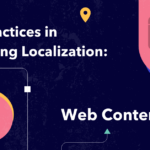
Industries like retail and gaming that have global customer bases need to make sure they can provide customer support and materials in a variety of languages. In fact, a 2020 survey by CSA Research found that 76% of people shopping online preferred to buy products that had information in their native language, and 40% said they would never buy from a website that wasn’t in their native tongue. Fortunately, there are ways to lower translation costs without sacrificing quality.
How does the retail industry use translation?
Translation helps retail companies provide better customer service, reach new audiences, and increase sales. Users today expect their shopping experience to be in their native language from end to end.
This includes providing native-language customer support, as customers increasingly expect that their needs will be met in their native language. According to The Unbabel Global Multilingual CX Report, 71% of consumers surveyed said that it’s very to extremely important that a brand promote and support its products and services in a user’s native language. This creates the necessity for quick, cost-effective translation services that are high quality and sound native in a way that resonates with audiences.
In order to meet the needs of customers in different countries, retailers should also provide multilingual content on their websites, catalogs, and product descriptions, in addition to native-language customer support. All of this means that retail companies are constantly in need of quick, high-quality translations.
How does the gaming industry use translation services?
According to a report by Ampere Analysis, the video game industry expanded its revenue by 26% between 2019 and 2021. With that revenue spread across countries like China, the US, Japan, South Korea, and Germany, translation in gaming is to success.
Customer support is an especially important focus for video game translation. Even if the games themselves have been localized, without solid support in a player’s native language, games can fall flat. Translation for customer support helps players feel like they’re part of a community, both by providing direct, native-language support as well as translations of other customer support materials to keep players in the loop, no matter what language they speak.
How much does it cost to translate per word?
How much translation agencies charge per word depends on several factors. Generally speaking, translation rates are charged per word or per page, and the final cost will vary depending on several factors, including:
-
The complexity of the content. A legal contract is likely to be more expensive to translate than single dialog prompts in a video game, for example. Poor translation quality has consequences in the legal and medical fields, so they might require more post-editing, which takes more time and costs more.
-
The language pair. If you’re translating from English to Spanish in the US, it’s going to be easier to find someone who can translate for you than if you’re trying to translate, say, Bulgarian to Vietnamese. This will also affect the final price you pay.
-
Translation memory matches. If you’ve already translated content similar to your source text, you might be able to save money by batching things, which allows a translator to stay in the flow of a single subject or topic, and thus make it easier for them. For example, doing a batch of similar legal contracts might end up costing you less than if you did them individually at different times.
-
Urgency. If you need your translated project finished quickly, you’re likely to pay a premium for the translator’s time.
Given these factors, costs can vary greatly, but in general, businesses should expect to pay anywhere from a few cents to several dollars per word for professional translation services.
For example, the translation cost per word for industries like retail and gaming tends to be relatively low, due to the general simplicity of the content. The average translation rate per word in these sectors is often between US$0.01 and US$0.10.
On the other hand, if you’re looking to translate medical or legal documents, the translation rate per word will be much higher, from something like US$0.15 at the low end to more than US$1.00 or more per word at the higher end.
Lower translation costs with Unbabel’s machine learning solution
Unbabel’s machine translation solution helps brands translate their content quickly, accurately, and cost-effectively. It also addresses many of the factors above that make human translation more expensive.
For example, content complexity is not as much of an issue; as long as the model was trained on data that’s similar to what is being translated, the model can handle it. And, it’s easier to train a new model to translate from, say, Hebrew to Thai than it is to teach someone to speak both languages or find someone who already does.
Machine translation engines are also faster than using humans, which can help reduce or eliminate rush fees; even slow turnarounds with machine learning tend to be days or weeks faster than using a human translator. Unbabel leverages this new technology to produce accurate translations and also lower costs.
All of these features of automation reduce translation prices per page, making it possible for companies in global industries like retail and gaming to keep costs down while still providing quality content to their customers.
In addition to using machine translation, Unbabel also uses post-model human editors to make sure that the automatically translated content is coherent and grammatical in the target language.
It’s all about assessing the quality of the machine learning model’s output as part of a comprehensive translation management system and using that to optimize results.
Why quality estimation is king
Unbabel’s award-winning quality estimation technology is how it can increase the speed of production while simultaneously lowering costs. The output of the machine learning translation solution isn’t simply words and sentences; it also includes an automatic quality score for each sentence, based in part on words that the system suspects are incorrect.
This allows human post-editors to focus their efforts on the places where it’s most needed — sentences with low-quality scores — and spend less time in places where the model is confident it got the translation correct. The Unbabel quality estimation system also helps identify refinements that Unbabel can make to our models in the future to make them even more accurate.
High-speed, high-quality translation technology
Overall, Unbabel’s machine translation solution, when paired with quality estimation, offers brands in the retail and gaming industries a cost-effective way to reduce translation costs while maintaining quality assurance.
Contact Unbabel today to optimize your next translation project or sign up for a translation program demonstration with one of our experts.












